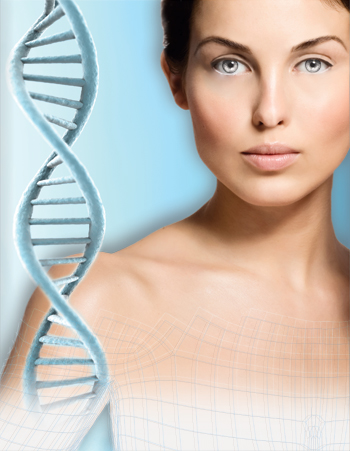You are fortunate to live in a time when the field of anti-aging medicine has become a vital and increasingly well-researched area of medicine. Health-care practitioners who are involved in anti-aging medicine are excited by the forward-thinking nature of this new approach, which involves helping people take the steps necessary to maximize quality of life in their later years. Basically, anti-aging medicine is concerned with three concepts.

Anti aging medicine is the pinnacle of biotechnology joined with advanced clinical preventive medicine
- Prevention: taking steps to prevent the development of diseases and ailments associated with growing older. Proper nutrition is a key element of prevention.
- Integration: combining the best of both worlds— conventional and alternative/complementary medicine—to achieve anti-aging goals.
- Holism: recognizing and treating people as whole beings composed of many integrated parts that work together. Thus an anti-aging approach to arthritis of the hip addresses all the factors that have an impact on arthritis, including diet, exercise level, social needs, stress management, emotional health, supplementation, and pharmaceuticals.
What is Anti-Aging Medicine?
Anti-aging medicine is the pinnacle of biotechnology joined with advanced clinical preventive medicine. The specialty is founded on the application of advanced scientific and medical technologies for the early detection, prevention, treatment, and reversal of age-related dysfunction, disorders, and diseases. It is a healthcare model promoting innovative science and research to prolong the healthy lifespan in humans. As such, anti-aging medicine is based on principles of sound and responsible medical care that are consistent with those applied in other preventive health specialties. The anti-aging medical model aims to both extend lifespan as well as prolong healthspan — the length of time that we are able to live productively and independently.
Anti-aging medicine is the following:
- It is scientific. Anti-aging diagnostic and treatment practices are supported by scientific evidence and therefore cannot be branded as anecdotal.
- It is evidence-based. Anti-aging medicine is based on an orderly process for acquiring data in order to formulate a scientific and objective assessment upon which effective treatment is assigned.
- Is well-documented by peer-reviewed journals. As of this writing, the National Library of Medicine hosts more than 3,000 peer-reviewed articles on the subject of anti-aging medicine.
Hundreds of scientific research studies clearly prove that modest interventions in diet, exercise, nutrition and single-gene modulation in the laboratory setting beneficially and significantly impact healthy function in old-age. Many of these interventions also modify maximum lifespan by 20 to 800% as well. With over the near-daily advancements in biomedical technologies related to research specifically focused on elucidating treatments for aging-related disorders and modulating the metabolic dysfunctions associated with old age, in the imminent near-future, effective interventions will become widely available to modulate the aging process itself in humans.
Researchers from the Harvard School of Public Health have found that the anti-aging lifestyle can add 24.6 more years of productive lifespan. The research team found that the longest-living Americans are Asian-American women residing in Bergen County, New Jersey USA. They live longer than any other ethnic group in the United States to an average lifespan of 91.1 years. In contrast, the Harvard team found that the shortest-living Americans are Native American populations in South Dakota, despite receiving free or low-cost government provided medical care living an average lifespan of 66.5 years. A distinguishing characteristic of the Bergen County women’s longevity is that they are availing themselves of the armament of state-of-the-art biomedical technologies in advanced preventive care, including preventive screenings, early disease detection, aggressive intervention, and optimal nutrition – all of which are cornerstones of the anti-aging medical model. [“Bergen County, NJ is long in longevity,†New York Times, September 12, 2006; “Asian women in Bergen have nation’s top life expectancy,†Free Republic, September 12, 2006.]
A first-ever study reveals the secrets of exceptional health in old age. Mark Kaplan, from Portland State University (Oregon, USA), and colleagues utilized the Health Utilities Index Mark 3 (HUI3), a multidimensional measure of health status, to examine the maintenance of exceptionally good health among 2,432 elder Canadians enrolled in the Canadian National Population Health Survey, which tracked participants’ health for a ten-year period, 1994 to 2004. The researchers found that the most important predictors of excellent health over the entire decade were:
- absence of chronic illness
- income over US $30,000
- having never smoked
- drinking alcohol in moderation
- maintaining a positive outlook
- managing stress levels
The team comments that: “Many of these factors can be modified when you are young or middle-aged. While these findings may seem like common sense, now we have evidence of which factors contribute to exceptional health [as we age].â€Â [Kaplan MS, Huguet N, Orpana H, Feeny D, McFarland BH, Ross N. “Prevalence and factors associated with thriving in older adulthood: a 10-year population-based study.â€Â J Gerontol A Biol Sci Med Sci. 2008 Oct;63(10):1097-104.]
Around the world, people are seeking medical guidance for ways to stay healthy, active, and vital well into their older years. As a result, the principles of the anti-aging lifestyle are gaining rapid and widespread acceptance as a framework for lifelong habits for healthy living.


